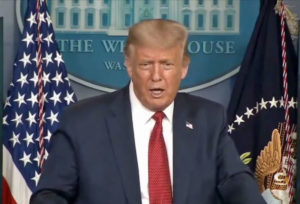 President Donald Trump was asked about efforts to lower or eliminate Brazil’s tariffs on U.S. ethanol during a press conference this week.
President Donald Trump was asked about efforts to lower or eliminate Brazil’s tariffs on U.S. ethanol during a press conference this week.
“I think that as far as Brazil is concerned, if they do tariffs, we have to have an equalization of tariffs,” President Trump responded. “It’s called reciprocal tariffs and you may be seeing something on that very soon.”
Pres. Trump on Brazil ethanol tariffsAccording to the Renewable Fuels Association, Brazil’s existing tariff rate quota (TRQ) is set to expire at the end of August, and some Brazilian industry and government officials have suggested that all U.S. ethanol should be subject to a tariff of at least 20 percent beginning in September.
RFA President and CEO Geoff Cooper wrote a letter to U.S. Trade Representative Robert Lighthizer this week to follow up on the president’s comments. “While we would strongly prefer a return to the free and fair two-way ethanol trade relationship that we enjoyed with Brazil between 2012 and late 2017, it has become clear that the Brazilian ethanol industry (and some of the nation’s political leaders) no longer share our desire for free and open markets. Regarding ethanol trade, Brazil has chosen a path of protectionism and obstruction; unfortunately, at this point, it appears we have no choice but to respond in kind.”
Cooper noted that U.S. fuel ethanol exports to Brazil have fallen dramatically under the country’s TRQ and 20 percent over-quota tariff. Brazil’s protectionist policies caused 2019 U.S. ethanol exports to Brazil to fall 33 percent compared to 2018, and shipments continue to slide in 2020. By some estimates, Brazil’s trade barriers have already resulted in the loss of demand for nearly 350 million gallons of U.S. ethanol valued at nearly $400 million since late 2017.
Meanwhile, Cooper said, U.S. imports of duty-free Brazilian ethanol are surging; year-to-date U.S. imports of Brazilian ethanol are at a seven-year high and nearly triple the five-year average volume for the same period.

